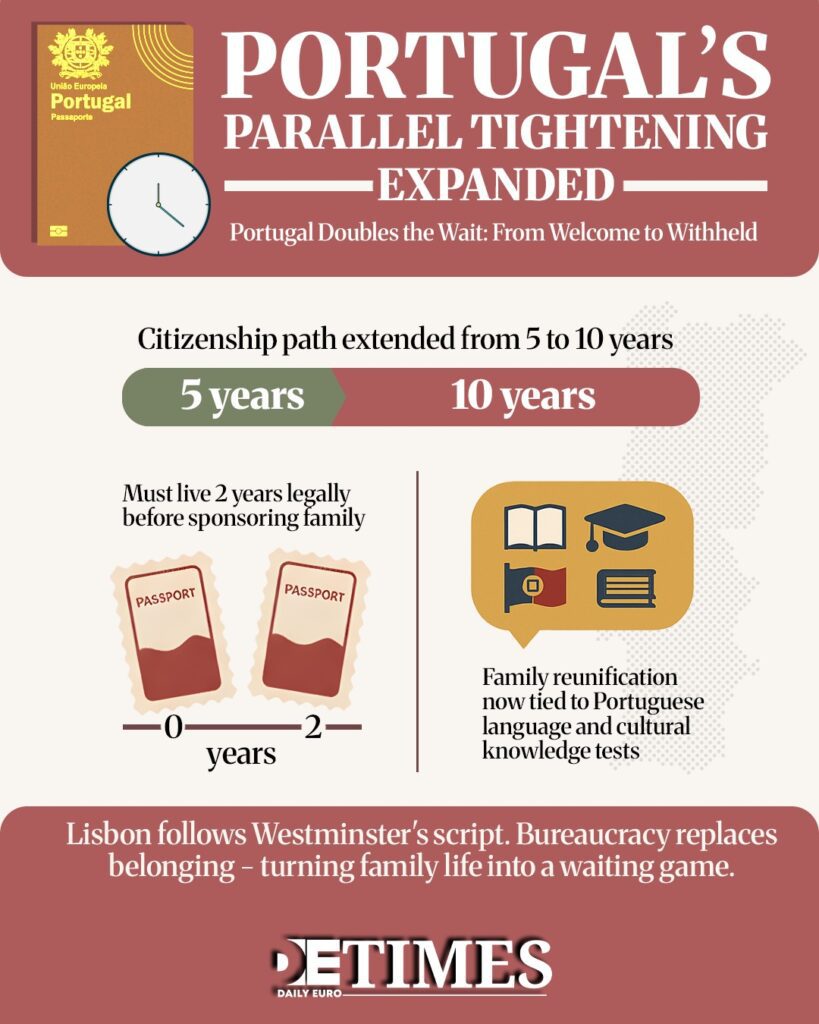In September 2025, Britain paused new refugee family reunion applications. The Labour government stopped refugees from bringing their children or partners. Home Secretary Yvette Cooper explained this was due to pressures on housing.
A few weeks later, Portugal followed suit. Lisbon introduced rules requiring two years of legal residency before someone can sponsor family reunions. This timing suggests more than just coincidence.
Britain Sets the Template
The number of refugee family reunion applications rose by 71% from 2023 to 2024. Westminster cited local service strains as the reason. Cooper described the need for “fair and properly enforced rules” to control the system here.
This suspension will last until spring 2026. Refugees wanting to reunite with family face longer waits to apply. The government promises reforms after reviewing the situation.
Enver Solomon from the Refugee Council warned that the new rules might drive desperate people towards smugglers. However, his concerns were overshadowed by Westminster’s rapid response to street protests.
Portugal’s Parallel Tightening
Portugal’s changes go even further. Foreign residents now must wait 10 years of legal residency before applying for citizenship, compared to the previous five years.
Authorities also redefined residency calculations. Time spent waiting for permit approval no longer counts toward residency. Thus, time in limbo is erased from citizenship eligibility.
To sponsor a spouse or dependent child, the resident must have lived legally in Portugal for at least two years. Family members must pass Portuguese language and cultural knowledge tests.
These rules mirror Britain’s language requirements and waiting periods for spouse visas, where applicants must earn at least £29,000 a year to bring partners.
Economic Reasons Mask Political Motives
Both governments justify restrictions by citing capacity issues. Britain talks about housing shortages; Portugal points to administrative delays.
The political reality is different. Labour faces pressure from Reform UK, which has gained support through anti-immigration campaigning. Portugal reacts to similar political pressures seen across southern Europe.
Britain’s policies offer a tested language and procedural framework. Portugal adopts this model to suit its system. Both avoid discussing the impact on people already contributing economically.
Refugee families often include skilled workers, like a Syrian engineer in Manchester or a Brazilian nurse in Lisbon, who find it hard to prove “commitment” when separated from their families. The stress of separation lowers productivity.

Forgotten Commitments to Protection
Britain once prided itself on protecting refugees. Portugal’s recent economic growth partly relied on immigration.
Safe Passage accuses the government of abandoning safe routes for children fleeing countries like Afghanistan and Sudan. In Portugal, children born to foreign parents no longer automatically get citizenship under new rules.
These second-generation families now must navigate complicated paperwork to prove parental residency. Parents with expired or delayed permits face children born stateless.
The Wider European Trend
Austria also paused refugee family reunions in 2025, citing pressure on public services like London. Three countries adopting similar policies in months suggests coordination or imitation.
EU members once had distinct refugee policies, but British post-Brexit changes now influence the continent. Portugal and Austria borrow British justifications despite still being under EU rights frameworks.
This trend conflicts with official EU protection values. Brussels lacks power to stop individual countries from tightening their rules, which happen faster than liberal reforms.
Measuring the Human Impact
A Somali mother in Liverpool cannot bring her teenage daughter from Nairobi. A Cape Verdean father in Porto waits two years before inviting elderly parents. These delays cause deep trauma.
Children separated from parents during early years may develop attachment issues. Elderly parents without family support deteriorate. Migrants become hesitant to invest in businesses until families join them.
Both Westminster and Lisbon treat family reunification as a privilege, not a right, though refugee law considers family unity essential for those fleeing persecution.
Where Policy Meets Life
Cooper announced a reciprocal arrangement with France: Britain sends refugees to France in exchange for approved applicants. However, France gains little from hosting more refugees; this move mainly deflects pressure.
Portugal’s 10-year path to citizenship discourages settlement. Skilled migrants opt for countries where children get citizenship at birth and spouses arrive quickly. Both risk losing talent to places like Canada or Australia.
Neither government explored alternatives. Britain could speed up application processing. Portugal could keep five-year citizenship with more integration help. Both chose restriction over reform.
Long-Term Consequences
Family separation policies predictably push people to smugglers. Refugee advocates warned that closing legal routes expands illegal ones.
Portugal’s reforms discourage long-term settlement. Temporary residents hesitate to buy homes or start businesses. Children born in Portugal but denied citizenship risk becoming a permanent underclass.
Britain normalises indefinite family separation as immigration control, influencing other European countries.
Family stability is the key pecuniary incentive for immigration. Separation lowers employment and school success. Governments trade economic productivity for political messaging.
How Policies Spread?
Westminster’s refugee policies spread through European networks. Ministers meet, civil servants share best practices. Portugal uses British ideas about fairness and sustainability.
This spread happens faster than democratic debate. Portuguese citizens didn’t discuss borrowing British refugee rules. British voters didn’t authorize export of these policies to EU members.
This “policy infection” works because restrictions face less scrutiny than expansions. Governments quietly adopt limits citing necessity while avoiding public debate needed to loosen rules.
Countries once competed to attract immigrants; now they compete to restrict them. Britain set this trend with its post-exit policy freedom.
Reversing the Trend
There are other ways. Canada keeps family reunification generous while managing numbers. Germany processes applications quickly, avoiding suspensions and backlogs.
Britain could end its freeze and hire more caseworkers. Portugal could return to five-year citizenship paths with better support for integration. Both countries have resources for kinder policies.
Current policies hurt economies and people. Families apart pay less tax and generate more social costs. Restrictive rules create chaos they claim to prevent.
European governments must ask if British-style restrictions truly serve their people. Lisbon’s copycat approach shows a lack of thoughtful consideration. Other countries might follow unknowingly.
Now the question is whether European voters will notice this shift before it becomes permanent. These “policy infections” spread faster than democratic oversight. Undoing these restrictions means recognizing they are imports, not necessities.
Keep up with Daily Euro Times for more updates!
Read also:
Huawei’s EU MEP Operatives Exposed in Latest Belgian Sting
A Match to a Flame: Reform UK and Immigration
Uganda: A Safe Haven for Asylum or M23?






